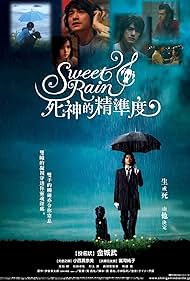IMDb RATING
6.8/10
1.3K
YOUR RATING
Kaneshiro plays a Grim Reaper who appears to his victims in human form and spends a week with them before deciding whether to off them or not.Kaneshiro plays a Grim Reaper who appears to his victims in human form and spends a week with them before deciding whether to off them or not.Kaneshiro plays a Grim Reaper who appears to his victims in human form and spends a week with them before deciding whether to off them or not.
- Director
- Writers
- Stars
- Director
- Writers
- All cast & crew
- Production, box office & more at IMDbPro
Featured reviews
I wonder whether it is really so or whether it only seems to me, but the way I see TK’s Chiba prompts me the following interpretation: On the one hand, shinigamis are immortal themselves (at least there was nothing in the film to suggest the opposite), but this is a doubtful blessing – just remember the limbo where TK’s character and his dog have to spend their time in between ‘missions’. It’s a dreary grey space where nothing happens, where nothing diverts the eye, where the time stands still. I wonder whether shinigamis find this space restful, or boring, or maybe just treat it with no emotion – but (once again, it is very subjective) it seems to me that TK’s character finds it a lonely place, or at least grows to find it a lonely place, and not a very ‘justified’ place for him to be in, to that. What I mean is he played a shinigami that evolves, changes, becomes more and more human (just look at his mimics, listen to his intonation when he’s speaking). What I see is his silent revolt against this limbo, and a sad reconciliation to the facts – to each his own, a human being gets a shortish earthly life full of emotion, mistakes, discoveries, and a shinigami gets his sad uneventful immortality. It looks as if somebody has robbed the shinigamis of something very important that Chiba begins to feel and to look for. At the same time he knows he’ll never be able to break through this fabric of his destiny.
Actually I see the film not as a chain of interconnected episodes, and not as the life story of the girl who rises from an ordinary girl of the crowd to a celebrity and then sinks into oblivion again, gaining maturity and understanding of things. I see the film as two major stories (the girl’s and the shinigami’s) that, though they develop along different lines, lead the viewer to the same conclusion. What really matters is the ability to understand, to love, to forgive, to look at the world with one’s eyes and mind open, to care, to be thankful to life for all the challenges it presented, to hope. Just remember the scene where she and Chiba are standing and looking at the peaceful sunlit landscape – it needs no words, it’s like an awakening (satori?). I think it is not by chance that at this particular moment Chiba finally sees the sun he longed for, for him it’s like a short but a very meaningful breakthrough, moment of freedom.
There’s one thing more I’d like to mention. I wonder, why the dog? What I mean is Chiba gets his orders through a dog, the dog is like an intercom channel connecting Chiba and some other higher being (beings?). Does the dog symbolize the fact that gods are beyond all things human? Or does it symbolize the fact that THERE ARE NO GODS but just a blind law of life, blind to its purpose as all the world of nature (what a sad mockery!)? Or is the dog a symbol of loneliness? What also prompts itself to me is an unexpected and maybe far-fetched analogy between Chiba and Faust (Chiba is more or less like Faust who’s through to his goals – immortality, power, knowledge that would make him godlike; though Faust was craving for these gifts, and Chiba is shown as already possessing them, and not of his own free will). If you remember, when Faust first asks for all these, a black dog comes to his side. In the Christian tradition a black dog stands for the devil. It’s very unlikely that the scriptwriter did it on purpose, but for me the allusion is there, and very striking. By the way, the final episode that I’ve already mentioned, their standing together and looking at the world, brings to mind the words of Faust when he asks the time to stop at that most perfect moment, recovering the living soul with these words (and no dog by his side any more!). By the way, it’s not by chance that it’s a woman who makes Chiba see through to all this, like Faust’s Margaret. It seems to me that Chiba is a kind of Faust ideal reversed, working to getting back to being human.
By the way, in the European folk archtypes rain stands for death. If one dreams of those who passed away, they are often seen wet through in the dreams; so the dead in our psyche come from the rain. Remember that when Chiba comes to earth it’s always raining? And mind that it finally stops raining. A coincidence? Hardly ever.
I certainly won’t claim that the makers of this film use these ideas consciously. The film is also very Japanese at that (the categories of wabi, sabi, shibumi, karumi and fueki ryuko are there all right). But in my opinion a good film touches some strings of heart and draws analogies visible for people with different backgrounds, of different cultures, be it done consciously or not. A good film is rich in meanings, tints and hues. I believe “Shinigami-no Seido” has it and is one of such films.
Actually I see the film not as a chain of interconnected episodes, and not as the life story of the girl who rises from an ordinary girl of the crowd to a celebrity and then sinks into oblivion again, gaining maturity and understanding of things. I see the film as two major stories (the girl’s and the shinigami’s) that, though they develop along different lines, lead the viewer to the same conclusion. What really matters is the ability to understand, to love, to forgive, to look at the world with one’s eyes and mind open, to care, to be thankful to life for all the challenges it presented, to hope. Just remember the scene where she and Chiba are standing and looking at the peaceful sunlit landscape – it needs no words, it’s like an awakening (satori?). I think it is not by chance that at this particular moment Chiba finally sees the sun he longed for, for him it’s like a short but a very meaningful breakthrough, moment of freedom.
There’s one thing more I’d like to mention. I wonder, why the dog? What I mean is Chiba gets his orders through a dog, the dog is like an intercom channel connecting Chiba and some other higher being (beings?). Does the dog symbolize the fact that gods are beyond all things human? Or does it symbolize the fact that THERE ARE NO GODS but just a blind law of life, blind to its purpose as all the world of nature (what a sad mockery!)? Or is the dog a symbol of loneliness? What also prompts itself to me is an unexpected and maybe far-fetched analogy between Chiba and Faust (Chiba is more or less like Faust who’s through to his goals – immortality, power, knowledge that would make him godlike; though Faust was craving for these gifts, and Chiba is shown as already possessing them, and not of his own free will). If you remember, when Faust first asks for all these, a black dog comes to his side. In the Christian tradition a black dog stands for the devil. It’s very unlikely that the scriptwriter did it on purpose, but for me the allusion is there, and very striking. By the way, the final episode that I’ve already mentioned, their standing together and looking at the world, brings to mind the words of Faust when he asks the time to stop at that most perfect moment, recovering the living soul with these words (and no dog by his side any more!). By the way, it’s not by chance that it’s a woman who makes Chiba see through to all this, like Faust’s Margaret. It seems to me that Chiba is a kind of Faust ideal reversed, working to getting back to being human.
By the way, in the European folk archtypes rain stands for death. If one dreams of those who passed away, they are often seen wet through in the dreams; so the dead in our psyche come from the rain. Remember that when Chiba comes to earth it’s always raining? And mind that it finally stops raining. A coincidence? Hardly ever.
I certainly won’t claim that the makers of this film use these ideas consciously. The film is also very Japanese at that (the categories of wabi, sabi, shibumi, karumi and fueki ryuko are there all right). But in my opinion a good film touches some strings of heart and draws analogies visible for people with different backgrounds, of different cultures, be it done consciously or not. A good film is rich in meanings, tints and hues. I believe “Shinigami-no Seido” has it and is one of such films.
I watched this film in a sold out theater at the Japan Society in New York and rare is it that I would rather have watched this at home. The audience was laughing out loud at times, which was very obtrusive to me. There are funny moments, but the film is kind of schizophrenic in its approach. The story is about a Grim Reaper (the very good Takeshi Kaneshiro) whose job is to decide whether three separate people live or die. Of the three vignettes, the second, involving a Yakusa, is not good at all. It drags down the film somewhat. The first is very good, the third almost as good, so you have to sit through about a half hour or so of less than good cinema. I find the inclusion of the reaper's companion, the black dog who makes no sound but communicates nonetheless, to be annoying by the end. Also, the reaper is not up on his everyday slang. Why not? Doesn't he follow people around and spend time with them? I was baffled by that. Those lines caused big laughs in the theater, but I found them to be cheap laughs. Now, the film has great moments. The character of Kazue Fujiki is sweet and the third vignette has a little twist which, though I figured it out before it was voiced, was still pretty nice. So, it is a flawed, but worthwhile film. Takeshi Kaneshiro is a popular actor, and I've liked everything I've seen him in. I liked this too, but I felt it was somewhat uneven. A bit of it reminds me of the Nicholas Cage film "City Of Angels" and Brad Pitt's "Meet Joe Black". If you liked those films, this is better. I recommend it, but if you watch it on DVD, consider fast forwarding through the second part. The film becomes a nine, okay?
The story is about a Grim Reaper, whose job is deciding whether or not the 'subject' is ready for unexpected deaths. The movie is divided into three episodes, first about an OL in her 20s, second about a yakuza in his 40s, and the last about an old lady in her 70s. All the different episodes seem to be unrelated, but connects spontaneously in the end.
Although the whole 'Shinigami' thing, which literally means 'death god' or 'Grim Reaper' is very common in Japanese culture, the concept somewhat reminded me of "Meet Joe Black", and the random encounter with other Shinigami reminded me of "City of Angels". However, I was relieved the story focused on the protagonist's gradual understanding of life rather than falling in love with his 'subjects'.
It has been a long time since I saw Kaneshiro Takeshi in a Japanese movie. He has been appearing in many epic Chinese/HK movies of late, and it was fun watching such 'S-class' actor in a Japanese film again. He played the innocent and composed personality of his character very well. I really liked the silent dog too. The subtitled conversation really adds to the fantasy in addition to the 'bridge and door'.
This film was exceptionally well directed. There were so many memorable scenes and advanced camera-work/angles. Even the special effects, other than the 'touch of death', were amazing considering Japanese budgets.
Personally, this movie didn't really make me ponder about life, so it may have failed in that aspect, but it was a story well told.
Although the whole 'Shinigami' thing, which literally means 'death god' or 'Grim Reaper' is very common in Japanese culture, the concept somewhat reminded me of "Meet Joe Black", and the random encounter with other Shinigami reminded me of "City of Angels". However, I was relieved the story focused on the protagonist's gradual understanding of life rather than falling in love with his 'subjects'.
It has been a long time since I saw Kaneshiro Takeshi in a Japanese movie. He has been appearing in many epic Chinese/HK movies of late, and it was fun watching such 'S-class' actor in a Japanese film again. He played the innocent and composed personality of his character very well. I really liked the silent dog too. The subtitled conversation really adds to the fantasy in addition to the 'bridge and door'.
This film was exceptionally well directed. There were so many memorable scenes and advanced camera-work/angles. Even the special effects, other than the 'touch of death', were amazing considering Japanese budgets.
Personally, this movie didn't really make me ponder about life, so it may have failed in that aspect, but it was a story well told.
The movie is beautifully shot, well acted and has a great classical soundtrack. It has that 90's Hollywood warmth to it, the grainy camera, the music. Like a Steven King film or Home Alone. The main character and his motives however don't make much sense and from the very first scene on I had question marks popping up in the rational side of my brain. But weirdly enough it is still very entertaining and nice to watch and the story has a certain poetry to it. A cozy movie for a rainy night.
Did you know
- TriviaThe concept of the Grim Reaper taking human form to experience the mortal realm is not something particularly new; parallels can easily be drawn to Brad Pitt's turn as a Grim Reaper in Meet Joe Black (1998). Both films share several elements in common; they involve the Grim Reaper taking on the suave visage of a pretty boy, they remove the sinister from the concept of Death itself, and they end up as a study of Life instead of Death. However, this is where the similarities end, and Sweet Rain: Shinigami no Seido, based on the bestselling novel by Isaka Kotaro (The Accuracy of Death), turns out to be a great story in its own right.
- SoundtracksSunny Day
Performed by Manami Konishi (under alias Kazue Fujiki)
Courtesy of DefSTAR RECORDS
Details
Box office
- Gross worldwide
- $4,851,480
- Runtime1 hour 53 minutes
- Color
- Sound mix
- Aspect ratio
- 1.85 : 1
Contribute to this page
Suggest an edit or add missing content

Top Gap
By what name was Sweet Rain: Accuracy of Death (2008) officially released in India in English?
Answer






















